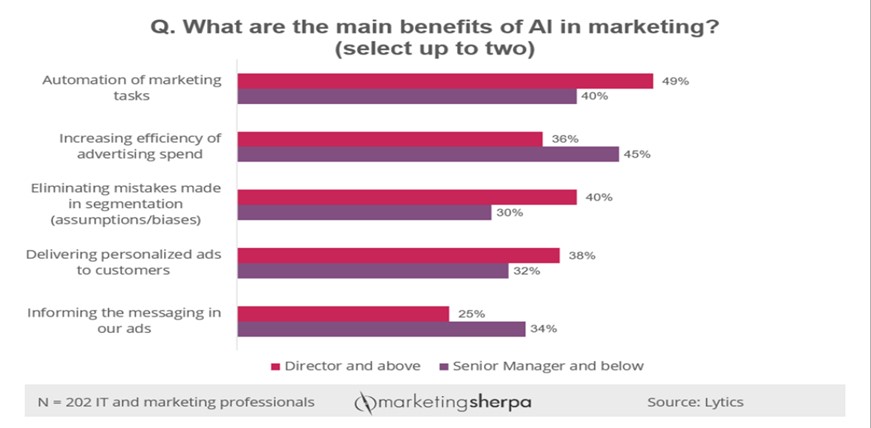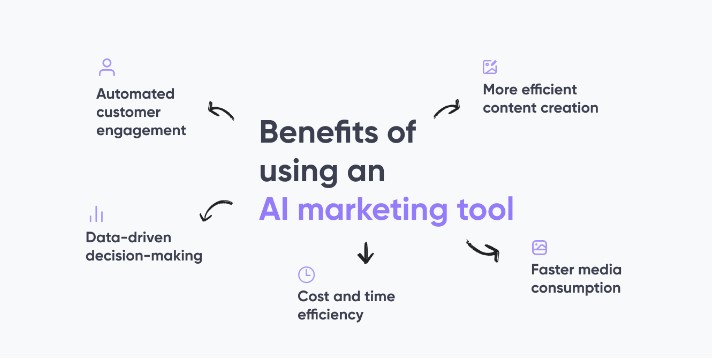

Dr Shruti Choudhary, Associate Professor, School of Business, Woxsen University Mr. Kulbir Singh, Sr. Director, Rooftop Digital
COO13
Feb2024
When you visualize what artificial intelligence (AI) "looks like," you might envision a synthetic mind created by humans, as shown in numerous sci-fi movies. Aside from the domain of science fiction, artificial intelligence (AI) is simply a technology that can accomplish activities that would ordinarily need human intelligence. These include problem-solving, emotional recognition, and even illness diagnosis.
According to research undertaken by marketing data hub platform Funnel, the rise of AI is revolutionizing the marketing sector and redrawing the map of how marketers interact with data. The scope of AI in marketing is rapidly expanding. According to AI Magazine, Google is embedding the technology into its marketing environment.
Businesses have always engaged with their consumers using a combination of human intuition and traditional analytics. However, the introduction of artificial intelligence (AI) and complex data interpretation is changing the customer interaction process.
Firms will foresee needs and desires rather of just responding to them, achieving a level of foresight never previously seen. This will restructure industries and change the character of consumer interactions.
The new applications of AI have improve the customer journey to agreat extanet, this is not only improve the marketing campaigns' return on investment (ROI) but effective client touch points. With the help of Technologies like AI, big data analytics, machine learning we can establish more with these insights, and utilized to automate previously manual procedures. Nowadays companies using AI for content generation, PPC advertisements, and even web design.
We examine the benefits and drawbacks of incorporating AI on marketing.
The positive impact of AI on Marketing:

The influence of AI on marketing is still being determined as new tools and methods, but it has the potential to be disruptive. As per the report of Wharton University, and other Research data customer segmentation and targeting are two important areas where AI may have a huge influence. Marketers may use artificial intelligence to evaluate client data and behavior, and segment the target audience based on demographic factors, and customize their marketing targeted campaigns accordingly. Such practices leads to greater customer engagement, conversion rates, and building client loyalty. Additionally, companies also use advance AI tools to automate marketing task including email campaigns, social media administration, AI-powered chatbots, virtual assistants and content development. This saves time, expenses, and focus on higher-value initiatives of marketer by automating marketing procedures and deliver individualized customer assistance and support.
Apart from that, a few popular applications of AI in marketing are as follows:
Predictive analytics will anticipate clients’ desires
Predictive analytics enabled by AI will anticipate wishes before they are expressed.
AI might create complex customer profiling and forecast purchase behaviors and upcoming requirements. It will collect biometric data through neuromarketing devices, such as eye, scroll speed, and help company to understand a customer preferences. Let consider the example of Netflix, by using powerful machine-learning algorithms they able to predict viewer preferences. And watch movements such as such as when customer paused a show, which episodes they skipped, and how long they pondered a specific title. With such detailed data sources, Netflix can forecast not just what a viewer will watch next, but also growing content preferences. It will then be able to adjust its original programming accordingly.
AI-driven content will birth next-generation storytelling
The expanding role of AI in content development will be centered. AI might alter content narratives in real-time based on actual user interactions. Such material will be based not just on explicit behaviors, but also on consumers' underlying subconscious preferences and unspoken thoughts. OpenAI distinguishes out as a pioneer in this area. Its powerful language models have begun to set the framework for content that dynamically adapts to user input by identifying and responding to underlying user feelings. These models, for example, may generate short tales, alter characters, and even suggest plot twists while ensuring the story resonates with the user's unstated tastes. Such advancements point to a future in which material, whether in literature, gaming, or virtual experiences, may generate a high level of emotional connection between creators and end users.
Hyper-personalisation will apply to the entire digital journey
Personalisation using AI will include creating fully unique digital experiences that accommodate for each individual's complexity and ambivalence. AI will comprehend users' emotional by noticing the click rates and customer purchase histories. For instance, Spotify is algorithms are capable of interpreting data points such as the rate at which songs are skipped and even the time of day tracks are played. This enables company to determine listener song preferences for intense music for a workout or calm sounds to unwind.
Programmatic advertising will become more precise and predictive
Programmatic advertising's future promises not just accuracy but also contextual relevance. Aside from an analysis of explicit clicks and page visits, ads will respond to live situational situations. AI will evaluate implicit behaviors - such as the time spent hovering over an ad or subtle navigation patterns - to comprehend and align with the audience's deeper, unstated interests. For instance, Google Ads algorithms are now diving into additional implicit patterns, such as how long a user hovers over an ad or the direction of their digital travel, in addition to analyzing clear indications such as clicks. This opens the door for advertising that not only match consumers' present interests but also forecast their future ones.
Seeing through the user's lens will move from talk to reality
Advanced visual recognition has the potential to provide highly intuitive product suggestions. AI will analyze implicit visual clues from user-generated material in addition to recognizing items and brands. for example, Photo backdrops, clothing colors, and even minor emotions portrayed in photos, might disclose unstated preferences or thoughts. All of this will contribute to more subtle marketing techniques.
Pinterest provides an intriguing peek into this tendency. Because of the platform's capacity to analyze the variety of visual information supplied by its users, very intuitive product and style suggestions have emerged.
Email marketing will set conversations, not campaigns
AI has the potential to revolutionize email marketing from broadcast-style efforts to conversations that seem like dialogues. Aside from open rates, AI will analyze user answers for sentiment. Even when people do not actively interact with an email - no clicks, no direct answers - their passive interactions can give AI with information. HubSpot is an excellent example of AI's revolutionary potential in transforming generic campaigns into meaningful discussions. The firm use AI to evaluate passive interactions, such as the length of time an email is open or the frequency with which it is visited. This enables it to detect user interest.
Chatbots will pave the way for more ubiquitous meaningful engagement
Chatbots' attraction will extend beyond their 24-hour availability. Chatbots powered by AI will progressively collect and comprehend the emotional underpinnings of user requests by detecting unspoken emotions such as irritation or enthusiasm. Chatbots will build a deeper, more human-like relationship by reacting with compassionate undertones without ever claiming to comprehend emotions. Intercom, for example, is using artificial intelligence to turn chatbot conversations from transactional exchanges to meaningful talks. The powerful AI-driven chatbots used by the firm not only answer to customer inquiries but also assess the emotional undertones underlying them.
Dynamic pricing and market dynamics will converge.
Dynamic pricing has the potential to grow into a live system that reflects real-time market dynamics. AI will track sales and inventory and able to shape price based on the "mood" of the market based on news, social media emotion, and other factors. For example, Uber's dynamic pricing approach. The company's AI system is intended to detect finer clues from the environment and altering pricing based on demand and supply,
Voice will usher in a new mode of digital interaction
As AI improves in speech recognition, it will be able to detect emotional undertones in voice inputs. Firms will thus be able to adjust replies or offers to a user's emotional state at the time, whether it is reluctance, exhilaration, or skepticism. Consider Amazon's Alexa. Its smart AI constantly improves its grasp of a user's emotional state by varying tone, pitch, and tempo. Alexa tailors its replies based on whether AI detects a trace of hesitancy or enthusiasm in a user's voice. For example, someone who appears harried may obtain more short responses, whereas a calm user may receive a more comprehensive response. This highlights the emerging power of voice-driven AI in changing digital interactions.
Sales forecasting will meld instinct with insights.
While AI will foretell market trends, the human touch will anchor these projections in reality. In sales forecasting, Salesforce exhibits this mix of human instinct with AI-driven insights. In addition to analyzing massive volumes of sales data, its advance AI technology can include delicate indications like buyer hesitancy. These system provides predicted insights as per clients' real-world needs. Only things to be considered here is transparent data management techniques, regulatory compliance, and trust will be essential.
AI Tools in used in marketing domain

There are several techniques that the organization use to increase the efficacy and efficiency of its operations. AI marketing solutions are software programs that use artificial intelligence techniques to automate processes, analyze data, and deliver significant insights for marketing strategy optimization. They offer tailored client experiences by automating repetitive processes, analyzing data to improve decision-making, and automating repetitive tasks.
In a competitive digital marketplace, these technologies provide marketers with efficiency, data-driven decision-making, and the capacity to deliver tailored campaigns. OpenAI's ChatGPT and Google's Bard for Copywriting and mixed uses, MidJourney for Image creation, Surfer SEO: for SEO content writing, Writer.com for Content writing, Zapier for Automation, Chatfuel for Chatbots, and Jasper AI for Copywriting are two of the most popular and widely used AI marketing tools.
The limitation of AI in Marketing:
According to HubSpot, artificial intelligence (AI) may help your marketing approach. However, there are also problems and restrictions to AI's productivity in marketing related with the replacement of Human connection by machines and occasionally inaccuracy in AI predictions and analysis, Also need massive amounts of relevant data.
Conclusion
AI's influence on marketing is revolutionary, with the ability to revolutionize how marketers operate. Marketers may boost campaign success, customer happiness, and business growth by properly using AI technology.
References
Devang, V., Chintan, S., Gunjan, T., & Krupa, R. (2019). Applications of artificial intelligence in marketing. Annals of Dunarea de Jos University of Galati. Fascicle I. Economics and Applied Informatics, 25(1), 28-36.
Haleem, A., Javaid, M., Qadri, M. A., Singh, R. P., & Suman, R. (2022). Artificial intelligence (AI) applications for marketing: A literature-based study. International Journal of Intelligent Networks.
Nair, K., & Gupta, R. (2021). Application of AI technology in modern digital marketing environment. World Journal of Entrepreneurship, Management and Sustainable Development, 17(3), 318-328.
Shaik, M. (2023). Impact of artificial intelligence on marketing. East Asian Journal of Multidisciplinary Research, 2(3), 993-1004.
Wu, C. W., & Monfort, A. (2023). Role of artificial intelligence in marketing strategies and performance. Psychology & Marketing, 40(3), 484-496.
https://knowledge.insead.edu/marketing/ten-ways-ai-transforming-marketing